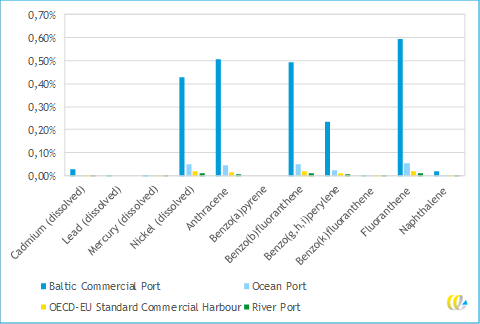Report: Scrubbers Have Limited Impact on Water Quality
Ships that use scrubbers have a small impact on the water quality in ports when compared to future E.U. standards for priority substances in water, according to a new study carried out by CE Delft, with support from Deltares.
The study calculates the predicted equilibrium concentrations for 11 metals and 16 Polycyclic Aromatic Hydrocarbons (PAHs). Four of these metals and seven PAHs are priority substances under the European Water Framework Directive. In most ports and for most substances, the increase in concentrations caused by continuous discharge of a relatively high amount of scrubber wash water is less than 0.1 percent of the limit value in the Directive for 2021 for these priority substances.
In ports with low hydrodynamic exchange (such as in the Baltic sea), the increase in concentration can amount to 0.6 percent of the limit value for a few PAHs.

Maximum concentrations as a percentage of 2021 MAC-EQS limits in the EU WFD (100% = MAC-EQS limit)
Source: CE Delft and Deltares 2019
The study is unique, as it uses empirical data from almost 300 scrubber wash water samples, the most extensive dataset of this kind analyzed in this manner, and because it employs the MAMPEC-BW model to calculate equilibrium concentrations in ports. MAMPEC-BW is a model that is widely used in a regulatory context, e.g. for the approval of ballast water management systems and antifouling agents.
A comparison of the increase in concentration in the sediment, assuming zero background concentrations, with different national standards shows that the increase is below 0.5 percent of any standard.
The study was commissioned by the Cruise Lines International Association Europe (CLIA Europe) and a number of industry partners. The report has been submitted to the GESAMP EGCS Task Team for consideration in relation to their advisory submission to the IMO on the impacts of scrubber wash water and as an IMO Information (INF) Paper for presentation at IMO PPR 7 in February 2020 by CE Delft.
The report follows preliminary results released earlier this year. The results are similar to those from a study conducted by Japan's Transport Ministry and from extensive data gathered aboard Carnival's scrubber-equipped cruise ships.

that matters most
Get the latest maritime news delivered to your inbox daily.
However, open loop scrubbers are being resisted in some regions. In November, Malaysia joined the list of nations and regions moving to ban the use of open-loop scrubbers in the run-up to the IMO2020 sulfur cap implementation. Earlier this year, the Maritime and Port Authority of Singapore banned the use of open-loop scrubbers in its waters and classified residues from scrubber operation as "toxic industrial waste (TIW)" under Singapore's Environmental Public Health Regulations.
The report is available here.
